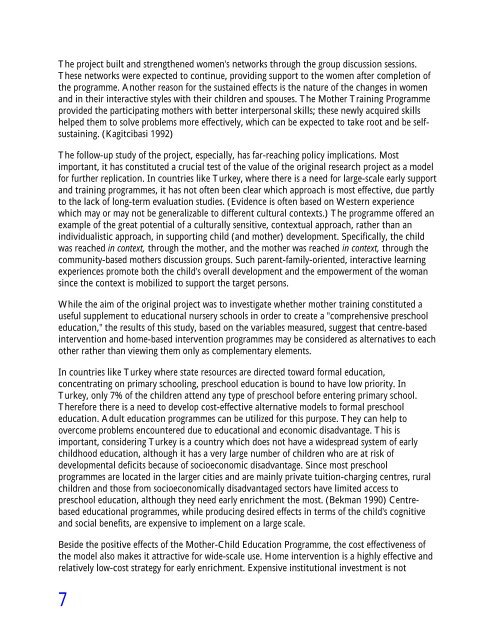How Policy Affects Early Childhood Care and Development.
How Policy Affects Early Childhood Care and Development.
How Policy Affects Early Childhood Care and Development.
Create successful ePaper yourself
Turn your PDF publications into a flip-book with our unique Google optimized e-Paper software.
The project built <strong>and</strong> strengthened women's networks through the group discussion sessions.<br />
These networks were expected to continue, providing support to the women after completion of<br />
the programme. Another reason for the sustained effects is the nature of the changes in women<br />
<strong>and</strong> in their interactive styles with their children <strong>and</strong> spouses. The Mother Training Programme<br />
provided the participating mothers with better interpersonal skills; these newly acquired skills<br />
helped them to solve problems more effectively, which can be expected to take root <strong>and</strong> be selfsustaining.<br />
(Kagitcibasi 1992)<br />
The follow-up study of the project, especially, has far-reaching policy implications. Most<br />
important, it has constituted a crucial test of the value of the original research project as a model<br />
for further replication. In countries like Turkey, where there is a need for large-scale early support<br />
<strong>and</strong> training programmes, it has not often been clear which approach is most effective, due partly<br />
to the lack of long-term evaluation studies. (Evidence is often based on Western experience<br />
which may or may not be generalizable to different cultural contexts.) The programme offered an<br />
example of the great potential of a culturally sensitive, contextual approach, rather than an<br />
individualistic approach, in supporting child (<strong>and</strong> mother) development. Specifically, the child<br />
was reached in context, through the mother, <strong>and</strong> the mother was reached in context, through the<br />
community-based mothers discussion groups. Such parent-family-oriented, interactive learning<br />
experiences promote both the child's overall development <strong>and</strong> the empowerment of the woman<br />
since the context is mobilized to support the target persons.<br />
While the aim of the original project was to investigate whether mother training constituted a<br />
useful supplement to educational nursery schools in order to create a "comprehensive preschool<br />
education," the results of this study, based on the variables measured, suggest that centre-based<br />
intervention <strong>and</strong> home-based intervention programmes may be considered as alternatives to each<br />
other rather than viewing them only as complementary elements.<br />
In countries like Turkey where state resources are directed toward formal education,<br />
concentrating on primary schooling, preschool education is bound to have low priority. In<br />
Turkey, only 7% of the children attend any type of preschool before entering primary school.<br />
Therefore there is a need to develop cost-effective alternative models to formal preschool<br />
education. Adult education programmes can be utilized for this purpose. They can help to<br />
overcome problems encountered due to educational <strong>and</strong> economic disadvantage. This is<br />
important, considering Turkey is a country which does not have a widespread system of early<br />
childhood education, although it has a very large number of children who are at risk of<br />
developmental deficits because of socioeconomic disadvantage. Since most preschool<br />
programmes are located in the larger cities <strong>and</strong> are mainly private tuition-charging centres, rural<br />
children <strong>and</strong> those from socioeconomically disadvantaged sectors have limited access to<br />
preschool education, although they need early enrichment the most. (Bekman 1990) Centrebased<br />
educational programmes, while producing desired effects in terms of the child's cognitive<br />
<strong>and</strong> social benefits, are expensive to implement on a large scale.<br />
Beside the positive effects of the Mother-Child Education Programme, the cost effectiveness of<br />
the model also makes it attractive for wide-scale use. Home intervention is a highly effective <strong>and</strong><br />
relatively low-cost strategy for early enrichment. Expensive institutional investment is not<br />
7
















